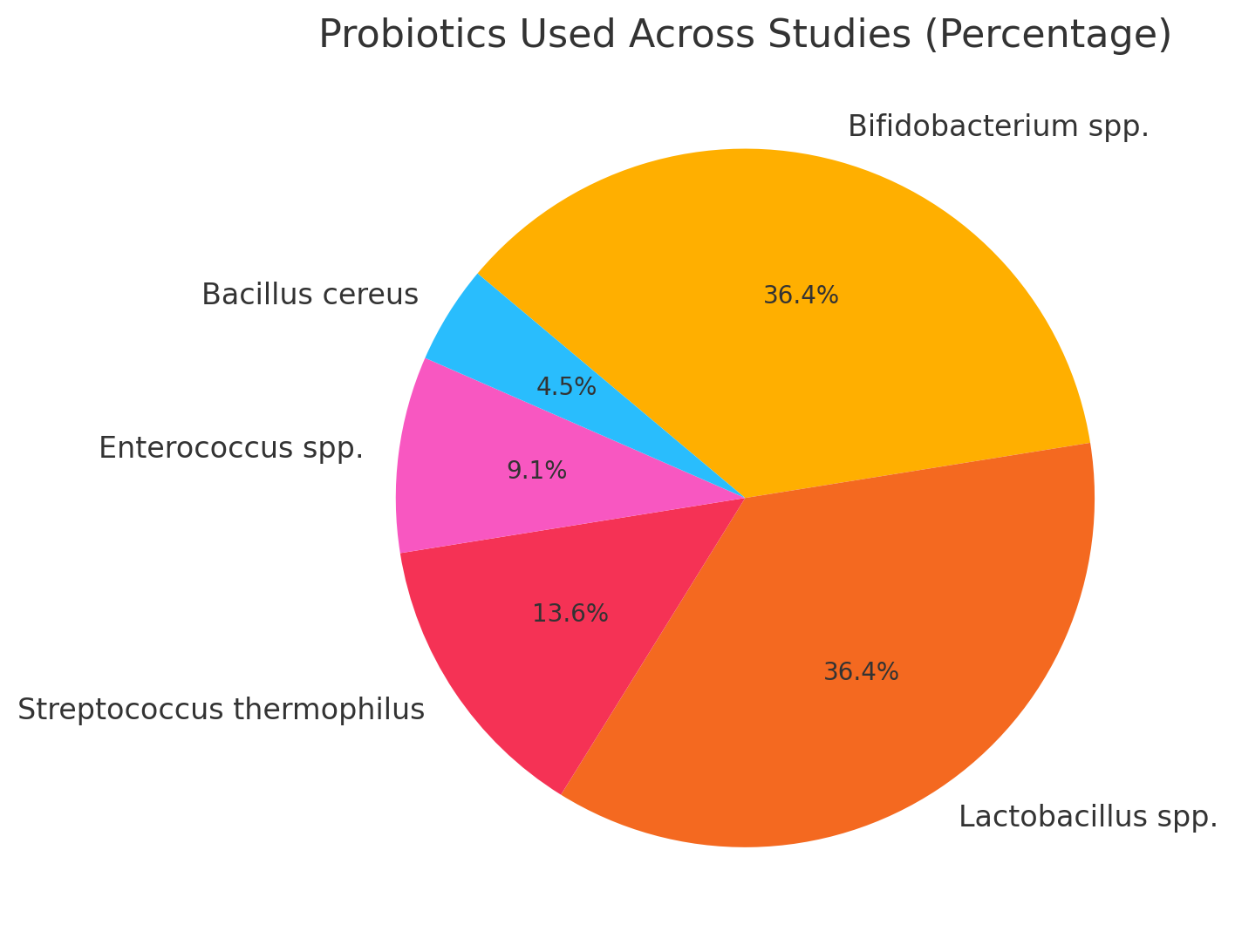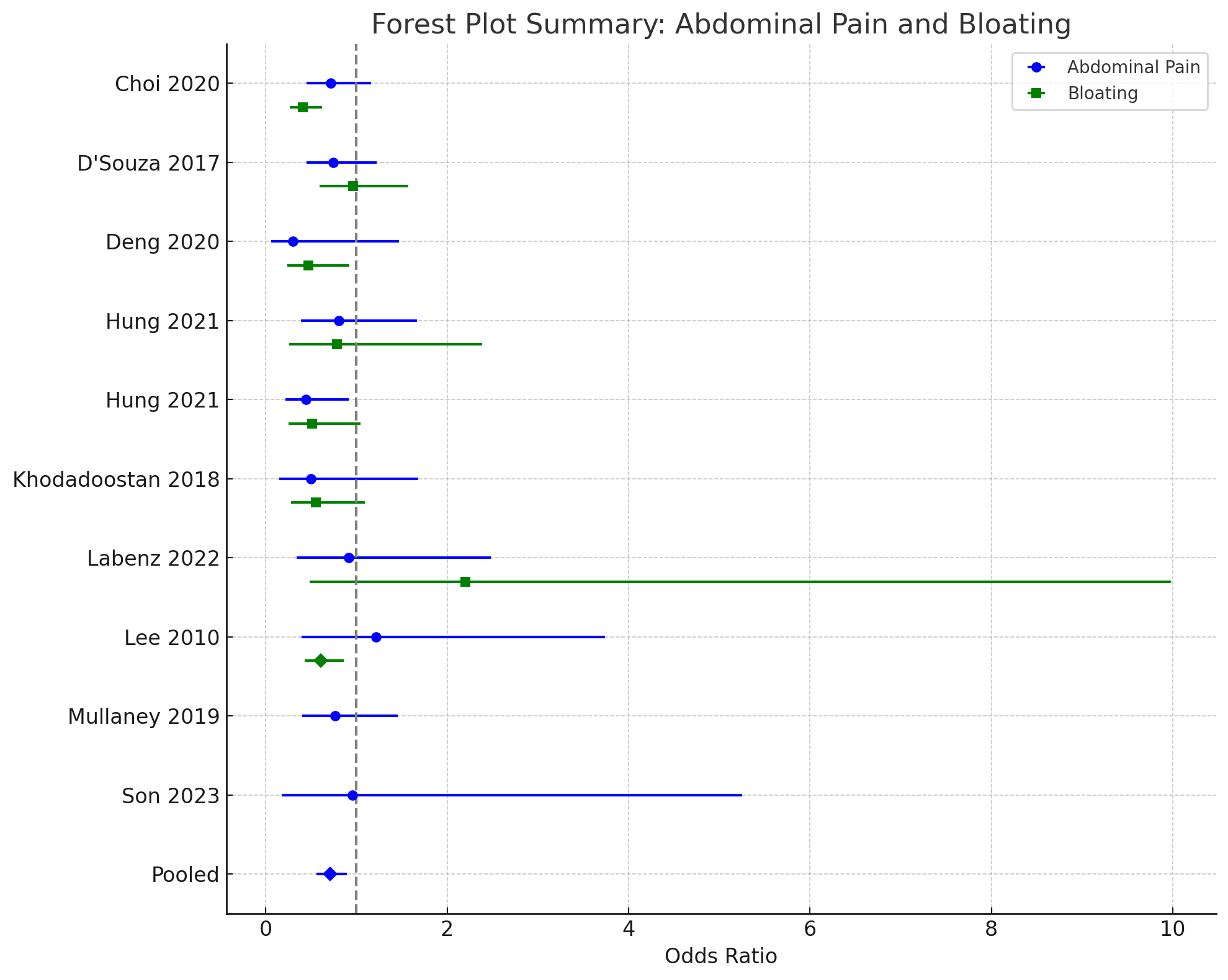Monday Poster Session
Category: Infections and Microbiome
P3443 - Efficacy of Probiotics in Reducing Post-Colonoscopy Gastrointestinal Symptoms: A Meta-Analysis of Randomized Controlled Trials
Monday, October 27, 2025
10:30 AM - 4:00 PM PDT
Location: Exhibit Hall
- TY
Tesfaye Yadete, MD (he/him/his)
Cleveland Clinic Foundation
Cleveland, OH
Presenting Author(s)
Tesfaye Yadete, MD1, Tinsae Anebo Anebo, MD2, Selome Yewedalsew, MD3, M Housam Nanah, MD4, Suha Abushamma, MD1
1Cleveland Clinic Foundation, Cleveland, OH; 2Thomas Jefferson Health, Philadelphia, PA; 3SUNY Downstate Health Sciences University, Brooklyn, NY; 4Cleveland Clinic, Cleveland, OH
Introduction: A colonoscopy is a crucial diagnostic procedure for evaluating intestinal health. Bowel preparation is vital for a successful colonoscopy, as it ensures clear visualization of the colonic mucosa. However, this process often reduces microbial diversity and disrupts the balance between beneficial and pathogenic bacteria, causing symptoms such as abdominal pain, bloating, and diarrhea, which may persist after the procedure. Probiotics have been suggested to alleviate post-colonoscopy symptoms by restoring microbial balance, but their efficacy has been inconsistent.
This meta-analysis aims to evaluate the efficacy of probiotic supplementation in reducing post-colonoscopy gastrointestinal symptoms.
Methods: A comprehensive literature search was conducted in collaboration with a medical librarian. Only randomized controlled trials (RCTs) published in English and involving patients aged 18 years or older at the time of colonoscopy were included. Pooled odds ratios (ORs) and 95% confidence intervals (CIs) were calculated using a random-effects model, and heterogeneity was assessed using I2 and τ2.
Results: Data from ten randomized controlled trials comprising 2,345 participants were included. There are no statistically significant differences in age, gender, or BMI distribution between the treatment and control groups. Probiotic use significantly reduced the risk of post-colonoscopy vomiting (OR: 0.34, 95% CI: 0.18–0.65, p=0.001, I²=0%), abdominal pain (OR: 0.71, 95% CI: 0.56–0.90, p=0.004, I²=0%), and bloating (OR: 0.61, 95% CI: 0.43–0.86, p=0.005, I²=43.7%). The effects for constipation (OR: 0.64, 95% CI: 0.41–1.01, p=0.054, I²=0%) and diarrhea (OR: 0.78, 95% CI: 0.51-1.18, p=0.239, I²=0%) were borderline significant in post-colonoscopy risks. No significant effects were observed for flatulence (OR: 0.75, p=0.44, I²=0%), heartburn (OR: 0.99, p=0.97, I²=0%), or nausea (OR: 0.60, p=0.28, I²=88.6%), with nausea showing high between-study variability. The sensitivity analysis confirmed the robustness of the results, with no single study having an undue influence on the outcome. No publication bias was found (Egger's test, p=0.139).
Discussion: Probiotics effectively reduce specific post-colonoscopy symptoms, particularly abdominal pain, bloating, and vomiting, with consistent effects across studies. These findings underscore the potential of probiotics to enhance patient experiences and may, in turn, encourage more patients to undergo future colonoscopies.

Figure: Percent distribution of probiotics used across studies.

Figure: Forest Plot Summary of Abdominal Pain and Bloating
Disclosures:
Tesfaye Yadete indicated no relevant financial relationships.
Tinsae Anebo Anebo indicated no relevant financial relationships.
Selome Yewedalsew indicated no relevant financial relationships.
M Housam Nanah indicated no relevant financial relationships.
Suha Abushamma indicated no relevant financial relationships.
Tesfaye Yadete, MD1, Tinsae Anebo Anebo, MD2, Selome Yewedalsew, MD3, M Housam Nanah, MD4, Suha Abushamma, MD1. P3443 - Efficacy of Probiotics in Reducing Post-Colonoscopy Gastrointestinal Symptoms: A Meta-Analysis of Randomized Controlled Trials, ACG 2025 Annual Scientific Meeting Abstracts. Phoenix, AZ: American College of Gastroenterology.
1Cleveland Clinic Foundation, Cleveland, OH; 2Thomas Jefferson Health, Philadelphia, PA; 3SUNY Downstate Health Sciences University, Brooklyn, NY; 4Cleveland Clinic, Cleveland, OH
Introduction: A colonoscopy is a crucial diagnostic procedure for evaluating intestinal health. Bowel preparation is vital for a successful colonoscopy, as it ensures clear visualization of the colonic mucosa. However, this process often reduces microbial diversity and disrupts the balance between beneficial and pathogenic bacteria, causing symptoms such as abdominal pain, bloating, and diarrhea, which may persist after the procedure. Probiotics have been suggested to alleviate post-colonoscopy symptoms by restoring microbial balance, but their efficacy has been inconsistent.
This meta-analysis aims to evaluate the efficacy of probiotic supplementation in reducing post-colonoscopy gastrointestinal symptoms.
Methods: A comprehensive literature search was conducted in collaboration with a medical librarian. Only randomized controlled trials (RCTs) published in English and involving patients aged 18 years or older at the time of colonoscopy were included. Pooled odds ratios (ORs) and 95% confidence intervals (CIs) were calculated using a random-effects model, and heterogeneity was assessed using I2 and τ2.
Results: Data from ten randomized controlled trials comprising 2,345 participants were included. There are no statistically significant differences in age, gender, or BMI distribution between the treatment and control groups. Probiotic use significantly reduced the risk of post-colonoscopy vomiting (OR: 0.34, 95% CI: 0.18–0.65, p=0.001, I²=0%), abdominal pain (OR: 0.71, 95% CI: 0.56–0.90, p=0.004, I²=0%), and bloating (OR: 0.61, 95% CI: 0.43–0.86, p=0.005, I²=43.7%). The effects for constipation (OR: 0.64, 95% CI: 0.41–1.01, p=0.054, I²=0%) and diarrhea (OR: 0.78, 95% CI: 0.51-1.18, p=0.239, I²=0%) were borderline significant in post-colonoscopy risks. No significant effects were observed for flatulence (OR: 0.75, p=0.44, I²=0%), heartburn (OR: 0.99, p=0.97, I²=0%), or nausea (OR: 0.60, p=0.28, I²=88.6%), with nausea showing high between-study variability. The sensitivity analysis confirmed the robustness of the results, with no single study having an undue influence on the outcome. No publication bias was found (Egger's test, p=0.139).
Discussion: Probiotics effectively reduce specific post-colonoscopy symptoms, particularly abdominal pain, bloating, and vomiting, with consistent effects across studies. These findings underscore the potential of probiotics to enhance patient experiences and may, in turn, encourage more patients to undergo future colonoscopies.

Figure: Percent distribution of probiotics used across studies.

Figure: Forest Plot Summary of Abdominal Pain and Bloating
Disclosures:
Tesfaye Yadete indicated no relevant financial relationships.
Tinsae Anebo Anebo indicated no relevant financial relationships.
Selome Yewedalsew indicated no relevant financial relationships.
M Housam Nanah indicated no relevant financial relationships.
Suha Abushamma indicated no relevant financial relationships.
Tesfaye Yadete, MD1, Tinsae Anebo Anebo, MD2, Selome Yewedalsew, MD3, M Housam Nanah, MD4, Suha Abushamma, MD1. P3443 - Efficacy of Probiotics in Reducing Post-Colonoscopy Gastrointestinal Symptoms: A Meta-Analysis of Randomized Controlled Trials, ACG 2025 Annual Scientific Meeting Abstracts. Phoenix, AZ: American College of Gastroenterology.
